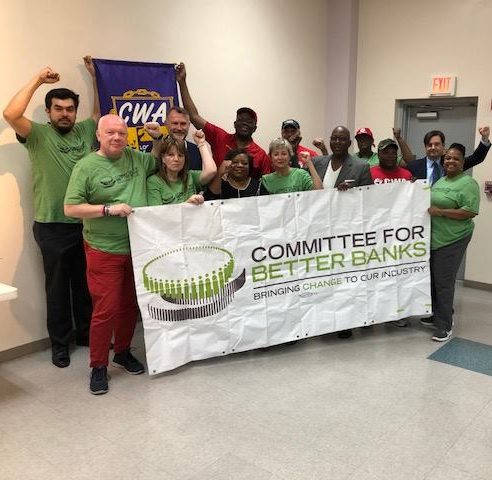Fighting for a Financial System that Works for Our Communities
The finance industry is plagued with systemic issues of discrimination, low-wages, extreme sales goals, and whistleblower retaliation. It also has the country’s lowest percentage of union representation. These conditions not only affect an estimated 1.27 million frontline workers in the United States, but affect all of us as the finance industry touches nearly every aspect of our lives.
Organizing both sides of the counter — workers and our communities — means more power to make change for both community members and bank workers. In other countries, union membership is the norm – over 3 million bank workers have union representation globally. With collective bargaining rights, U.S. bank workers could demand not only a living wage and a voice in their sales goals and metrics, but could take it a step farther to demand an end to forced arbitration and non-disclosure agreements for workers and consumers. With job security and just cause provisions, they could feel real comfort in blowing the whistle when they see wrongdoing and predatory practices. They could be the customer service and financial advisors they ultimately want to be. And they could regulate the banks for all of us, from below – especially now, when we need them the most.
For more on our finance work, contact Sara at sara.myklebust@georgetown.edu.

BCG Finance Resources
- Banking Scorecard. A tool to grade the performance of banks and how well they protected workers and consumers during the COVID-19 crisis.
- Committee for Better Banks
- “Bargaining for the Common Good and the Fight for Better Banks for Our Communities.” An article in The Forge how bank workers are fighting back for their communities.
- “Bank Workers Rising.” From The American Prospect, an article on the the formation of the Committee for Better Banks and bank working organizing.
- “PPP Lawsuits Allege Banks Favored Larger Customers, A Second Round Of Funding Likely.” On how the Paycheck Protection Program disproportionately helped large corporations over small businesses.
- “Banks Should Face History and Pay Reparations.” On racialized wealth.
- “Lawsuit alleges Wells Fargo unfairly shuffled Paycheck Protection Program applications.” On Wells Fargo and profiting off of local businesses during COVID-19.
- “Wells Fargo employees say little has changed since fake accounts scandal.” Committee for Better Banks fights back against predatory banking.